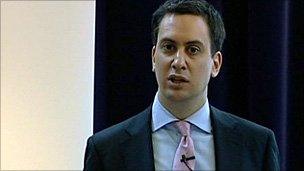Ed Miliband warns of cost of living 'crisis'
- Published
- comments

Mr Miliband said those at the top had benefited the most from economic growth
Labour leader Ed Miliband has warned of an impending "crisis" as the cost of living outstrips wage rises for people on low and middle incomes.
In a speech he said people were working "harder for less" because of long-term changes to the British economy.
The coalition's cuts strategy was about to "crash" into those trends and hit those on modest incomes, he said.
The government blames Labour for the UK's budget deficit which it says put Britain in the financial "danger zone".
Mr Miliband was addressing the Resolution Foundation, a think tank which suggests wages for low and middle earners have failed to keep pace with wider economic growth since the 1970s.
'Failure'
The Labour leader said while working people had once benefited from rising prosperity, now the richest continued to do well while "middle earners" were no longer guaranteed to benefit.
The majority of people had been "struggling to keep up", and a "quiet crisis" was unfolding in homes across the country as people were "locked out of the benefits of economic growth".
The Labour leader argued that the demand for cheap credit had helped bring economic instability: "Because wages weren't keeping up with the pressures on families too many were forced to borrow to finance their living standards."
He said Labour was "wrong not to focus more on the type of economy we were building and what that meant for the widening gulf between those at the very top and the rest".
But he said they had taken action through tax credits to help families - and argued that the coalition's "reckless strategy for deficit reduction" was about to "crash into these long-term trends".
Mr Miliband said a single-earner couple on £44,000 a year with two children "sounds well off" but would be hard hit by the loss of their child benefit.
He said the rise in VAT combined with the scrapping of child benefit, cutting the childcare element of working tax credit and public service cuts would hit families with children: "Taken together I believe these changes will mean a cost-of-living crisis for ordinary families in Britain which will have a deep impact for years to come".
And he suggested companies could be rewarded with tax incentives to pay staff a "living wage" - higher than the minimum wage - and encouraging companies to invest in training their employees to help them get on.
'Squeezed middle'
In a 91╚╚▒Č interview he defined the "squeezed middle" as "people who are basic rate taxpayers - some people just into the higher rate of income tax on 40-odd grand" who had seen their wages flatten while their cost of living rose.
Last week US Treasury Secretary Timothy Geithner said he was "very impressed" by Chancellor George Osborne's financial strategy and earlier this month the Institute for Fiscal Studies think tank said the government should not relax its plans for spending cuts and tax rises.
Prime Minister David Cameron argues that if the UK's budget deficit is not tackled, it would lead to a loss of confidence and the UK could end up with the sort of economic problems faced by Greece or Ireland.
The Labour peer and former cabinet minister Lord Mandelson has said in his book that Mr Miliband had given "no strong clue" about Labour's direction under him, during the Labour leadership contest last year. Lord Mandelson, one of the architects of New Labour, also said Mr Miliband had been unwise to declare the concept dead.
But Mr Miliband told the 91╚╚▒Č New Labour was "right for its time" but "we need new ideas for the future, we need things building on some of the things Peter Mandelson did to build industrial policy for our country so we have those high-quality manufacturing jobs in our country".
"We need to look at new approaches and that is what I am trying to do as leader of the Labour Party."
- Published25 February 2011
- Published2 February 2011
- Published31 January 2011
- Published30 January 2011